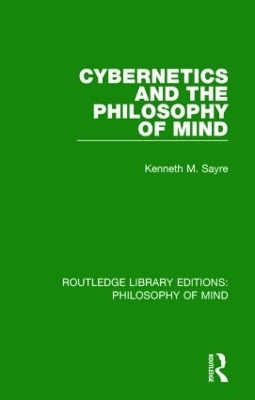
Cybernetics and the Philosophy of Mind
Seiten
2014
Routledge (Verlag)
978-1-138-82546-8 (ISBN)
Routledge (Verlag)
978-1-138-82546-8 (ISBN)
This book, published in 1976, presents an entirely original approach to the subject of the mind-body problem, examining it in terms of the conceptual links between the physical sciences and the sciences of human behaviour. It is based on the cybernetic concepts of information and feedback and on the related concepts of thermodynamic and communication-theoretic entropy.
The foundation of the approach is the theme of continuity between evolution, learning and human consciousness. The author defines life as a process of energy exchange between organism and environment, and evolution as a feedback process maintaining equilibrium between environment and reproductive group. He demonstrates that closely related feedback processes on the levels of the behaving organism and of the organism’s nervous system constitute the phenomena of learning and consciousness respectively. He analyses language as an expedient for extending human information-processing and control capacities beyond those provided by one’s own nervous system, and shows reason to be a mode of processing information in the form of concepts removed from immediate stimulus control. The last chapter touches on colour vision, pleasure and pain, intentionality, self-awareness and other subjective phenomena. Of special interest to the communication theorist and philosopher, this study is also of interest to psychologists and anyone interested in the connection between the physical and life sciences.
The foundation of the approach is the theme of continuity between evolution, learning and human consciousness. The author defines life as a process of energy exchange between organism and environment, and evolution as a feedback process maintaining equilibrium between environment and reproductive group. He demonstrates that closely related feedback processes on the levels of the behaving organism and of the organism’s nervous system constitute the phenomena of learning and consciousness respectively. He analyses language as an expedient for extending human information-processing and control capacities beyond those provided by one’s own nervous system, and shows reason to be a mode of processing information in the form of concepts removed from immediate stimulus control. The last chapter touches on colour vision, pleasure and pain, intentionality, self-awareness and other subjective phenomena. Of special interest to the communication theorist and philosopher, this study is also of interest to psychologists and anyone interested in the connection between the physical and life sciences.
Sayre, Kenneth
Preface Part 1: The Mind-Body Problem 1. Introduction Part 2: Fundamentals 2. Information 3. Entropy 4. Feedback 5. Causation Part 3: Organism and Environment 6. Life 7. Evolution 8. Learning 9. Consciousness Part 4: Mentality 10. Society 11. Language 12. Reason 13. Subjectivity
| Erscheint lt. Verlag | 3.11.2014 |
|---|---|
| Reihe/Serie | Routledge Library Editions: Philosophy of Mind |
| Verlagsort | London |
| Sprache | englisch |
| Maße | 138 x 216 mm |
| Gewicht | 453 g |
| Themenwelt | Geisteswissenschaften ► Philosophie ► Sprachphilosophie |
| Geisteswissenschaften ► Psychologie ► Allgemeine Psychologie | |
| Geisteswissenschaften ► Psychologie ► Sozialpsychologie | |
| ISBN-10 | 1-138-82546-8 / 1138825468 |
| ISBN-13 | 978-1-138-82546-8 / 9781138825468 |
| Zustand | Neuware |
| Haben Sie eine Frage zum Produkt? |
Mehr entdecken
aus dem Bereich
aus dem Bereich
Macht und Legitimität politischer Sprache im Prozess der europäischen …
Buch | Softcover (2023)
Nomos (Verlag)
74,00 €
Wie die Menschheit zu ihrer größten Erfindung kam
Buch | Softcover (2022)
C.H.Beck (Verlag)
18,00 €


